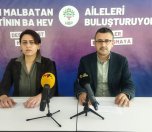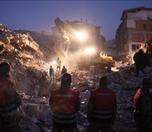Click to read in Turkish
In the Southeastern city of Diyarbakır, dozens of citizens who saw their houses getting heavily damaged in the February 6 earthquake currently reside in tents in the Yenişehir and Bağlar districts.
Particularly women and children have it rough. While basic needs are difficult to find for women, medicine is hard to obtain for sick children. On top of that, the number of women social workers is low.
''We live here together with two families,'' says Revşen Kaya, who stays in stays in a self-made tent together with her six-month-old baby and five children. Their building did not collapse but got severely damaged.
''Because of that, we were scared and didn't return to our home. My oldest son psychologically broke down. On the hand, I try to take care of my children's health issues. On the other hand, I am trying to get our basic needs,'' Kaya explains, adding that dealing with these issues is tough.
''I sometimes forget my own urgent needs. My children have it really cold, and my six-month-year-old daughter constantly needs to be fed, '' Kaya says.
Another woman, who wanted to remain anonymous, shows one slipper. ''Since the first day of the earthquake, I only have one slipper on my foot. The temperatures are low, I am freezing and for days, I have not found someone who could help me with these needs,'' she explains.
Hygiene is especially an issue within the tent camp. As there is no portable toilet, women must go to the nearest mosque, wedding hall, or petrol station.
Another woman who wants to remain anonymous explains that since the day of the earthquake, she has been going to the mosque for her basic necessities. ''If you ask whether or not it is hygienic? It is not hygienic at all. It is at a level that especially women would get immediately sick,'' she complains.
''But with no other solution and nobody to address these issues to, we are forced to use it. However, today the mosque's toilet was closed. We don't know why. Sometimes, children wake up in the middle of the night and ask that I bring them to the toilet. But how can I bring them in the middle of the night? To where can I bring them? This issue must be solved, or else more people will suffer and get sick,'' she says.
Abit Kaya*, whose wife gave birth in a tent, is clinging on to life. But the supply of medicine for children who are sick because of the cold is slow, there are not enough pads for women, and women who had babies cannot get medicine.
''As our house was badly damaged in the earthquake, we can't go home. My wife was pregnant and gave birth in such bad conditions. Currently, we stay in a tent. We have difficulty getting my wife medication, although she really needs it,'' Kaya explains. (NÖ/WM)
*Abit Kaya is not a relative of Revşen Kaya





.jpg)


.jpg)

.jpg)
.jpg)
.jpg)

.jpg)